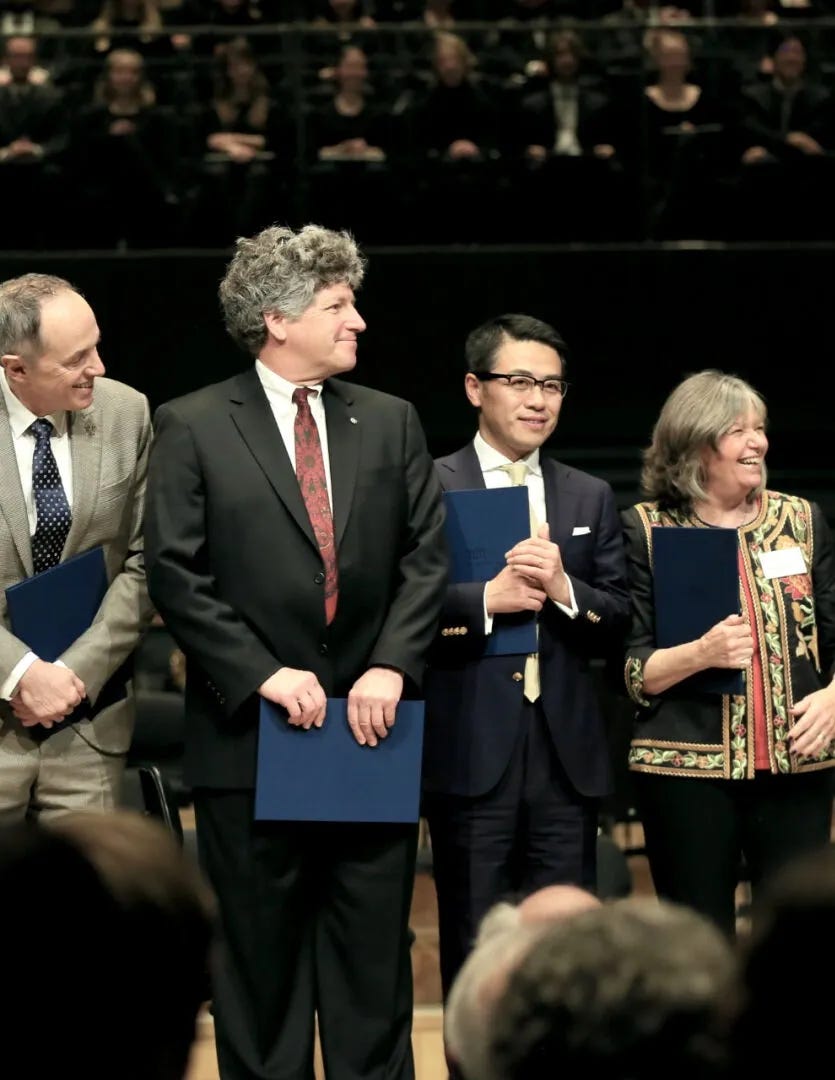Founder of Orthogonal: A Disruptor in the Aesthetics of Intelligent Industry
Amid the blooming intelligent industrialization, aesthetic, humanistic, and artistic elements are seldom mentioned concepts. For most people, "beauty and humanities" seem to be a luxury item far removed from technology or industry, or elements not directly related to the monetization model of the technology industry.
However, a scientist-entrepreneur who focuses on industrial design aesthetics is trying to challenge this perception: Dr. Yang Ji, founder and CEO of Orthogonal, who "graduated" from a position as a scientist at the German Aerospace Center and returned to his home country, firmly believes that the entire process from design to development of technological products should integrate the beauty of humanities and arts: "We hope to convey innovation, care, and the humanistic spirit of design aesthetics to every user through countless nuances in the product."
In fact, as a startup company, Orthogonal focuses on the computer-aided design and engineering market, focusing on providing professional software and exclusive hardware solutions for intelligent product design. The market size of its industry can reach billions of dollars worldwide, and its core technology covers the field of intelligent products in industries such as aerospace, automotive, robotics, and shipping. Unlike most industrial software companies, Orthogonal's product philosophy emphasizes aesthetic elements, and the team's deep contemplation of industrial aesthetics is elevated to the same level of importance as technical elements, demonstrating a cross-sectional thinking of "industrial research and design."
To achieve this, Orthogonal has built a research and development team composed of artists and scientists and chose to root itself in an office located in the alleys of the Wutong District in Shanghai. In contrast to the traditional impression of technology-based startups, Orthogonal's office environment is rich in artistic atmosphere, with the walls of the office adorned with the ten design principles of German industrial designer Dieter Rams.
Orthogonal's office in the alleys of the Wutong District in Shanghai
Based on the company's unique products and business philosophy, Orthogonal has completed two rounds of financing totaling millions of dollars. At the end of 2023, Dr. Yang Ji, the company's founder, also received an honor from his alma mater - the "TUM Ambassador" for the year 2023, from the Technical University of Munich (TUM). As a prestigious award from one of Germany's top universities, this honor is not easily attained, with past recipients including globally renowned researchers such as Nobel laureates or presidents of Imperial College London. Dr. Yang Ji's award also makes him the first non-academic recipient of this honor in the university's over 150-year history. Reflecting on the experience of receiving the award personally from the university president, Prof. Dr. Thomas F. Hofmann, at the annual concert, Dr. Yang Ji expressed profound emotions: "When I first enrolled at TUM in 2000, I had no idea that the president's office was right above the new student registration office. It took me a full 23 years to walk from the first floor to the second floor."
The goal of the Orthogonal team's entrepreneurial endeavor is to help more people create high-tech intelligent products that integrate humanistic and artistic elements.
How can aesthetics and humanistic ideals be shaped in the field of intelligent technology industries? To explore this, the Quadrant Lab Think Tank specially visited Dr. Yang Ji, who worked as a senior scientist at the German Aerospace Center for 10 years. He is a rare Chinese scientist at the German Aerospace Center and also an expert in the Modelica simulation design computer language. He is the only Chinese doctoral student of Professor Martin Otter, the chairman of the Modelica Association.
Combining his own experiences and entrepreneurial practices, Dr. Yang Ji shared with us his reflections on starting a business after years of academic research and his dialectical thinking on aesthetics, humanism, and technology.
01 The Entrepreneurial Challenge for Scientists Does Not Primarily Come From Commercialization
Quadrant Lab : You worked as a senior scientist at the German Aerospace Center for many years and participated in many EU and industrial research projects related to Modelica technology. How did this experience influence your decision to found Orthogonal?
Dr. Yang Ji: Modelica language is a computer language used for physical behavior simulation, which was a crucial technology I frequently utilized during my tenure at the German Aerospace Center. In essence, Modelica describes physical behavior as a computer engine that can depict dynamic behaviors in various physical domains such as electrical, mechanical, hydraulic, pneumatic, and thermal. While many games also incorporate physics engines, Modelica language stands out as a more rigorous scientific physics engine.
Applying Modelica technology presents an excellent solution to address the majority of pain points during robot design and development. However, existing industrial design software based on Modelica technology, such as those by Dassault or Siemens, have been around for 20 to 30 years, with many industry pain points yet to be resolved. Hence, I aimed to create a brand-new product that could revolutionize existing tools and significantly enhance user experience in designing future intelligent products.
Certainly, the German Aerospace Center provided an excellent job opportunity, with superior environments and conditions in all aspects, from which I gained significant experiences. However, as time went by, I gradually realized it was not conducive to product development. It focused more on innovating and breaking through underlying technologies, whereas I aspired to develop products that could be widely used. Over the course of my ten years at the German Aerospace Center, I accumulated extensive technical skills, particularly in the research and development of underlying technologies. This allowed our team to clearly understand the technological boundaries of innovation and set clear goals for product development. I believe these are essential skills for a CEO of a technology-oriented startup company.
As a scientist transitioning into an entrepreneur, what was the biggest challenge you faced in the transition process? How did you overcome them?
Dr. Yang Ji: This is a question I am often asked, and it's something that many government leaders and investors are concerned about and contemplate. Typically, there's a concern that scientists transitioning into entrepreneurship may not excel in areas like commercialization, marketing, sales, and customer relations.
However, I believe that if the product itself is excellent, the challenges in commercialization are not particularly high. The qualities required of an excellent scientist and a great entrepreneur are not significantly different; in fact, they share many commonalities, such as resilience, innovation, rebellion, patience, pursuit of perfection, and even kindness.
Scientists are accustomed to contributing better scientific methods or solutions in their field under the support of government or corporate funding, and the essence of this work is consultancy and service. On the other hand, for entrepreneurs, the most important mission is to create excellent products. Therefore, in addition to the qualities mentioned above, entrepreneurs must also possess talent and conviction in creating outstanding products.
In other words, transitioning from being a scientist to an entrepreneur, and from the inherent consultancy service model to the product creation model, successfully creating an excellent product is the biggest challenge, even surpassing the commercialization aspect. In my view, for scientists to excel as entrepreneurs, they need to learn from excellent artists, just as they relentlessly pursue perfection in their artwork, they must have the utmost pursuit of perfection in their products. The initial intention of our entrepreneurship is to create world-class excellent products.
Last year, you were awarded the title of "TUM Ambassador" by the Technical University of Munich (TUM). What significance and impact does this hold for you personally and for the company?
Dr. Yang Ji: Since 2013, the Technical University of Munich has annually selected a group of top international scientists, conferring upon them the title of "TUM Ambassador" to recognize their achievements in future-oriented research fields and their contributions to the global TUM community. By the end of 2023, a total of 97 ambassadors had been selected.
Having the honor of becoming the first non-academic recipient of this prestigious title in the tenth year of its history, I was deeply moved. It was a profound acknowledgment and encouragement from my alma mater, and it also left a mark on the development journey of Orthogonal within this esteemed German institution with over 150 years of history.
During the two-day award ceremony, I engaged in in-depth discussions with fellow ambassadors, professors, and university leaders. Despite hailing from different parts of the world and possessing diverse professional backgrounds, our common focus and discussions revolved around global issues such as reducing childhood cancer rates and addressing energy supply and education in underdeveloped regions of Africa. This shared commitment to the common progress of human society left a lasting impression on me and embodies the most important spiritual essence of Orthogonal.
The significance of this honor for us lies primarily in two aspects. Firstly, it strengthens and boosts our confidence in the entrepreneurial path. While the Technical University of Munich has historically not placed particular emphasis on rankings, in recent years, the school has increasingly encouraged student innovation and entrepreneurship. It even aims to manage the university like a business. With the university's recognition and support, we feel more assured and confident in our entrepreneurial journey. Secondly, this honor serves as a strong endorsement for our international expansion. When seeking global business support in the future or collaborating with top research institutions, this recognition will provide us with the most direct and favorable conditions. As a TUM Ambassador, I automatically become a lifelong member of the TUM Advanced Technology Research Institute. Additionally, starting from 2024, I will establish new research projects and courses at TUM as a visiting scientist, allowing Orthogonal's latest tools to be practically applied here, thus taking the first step towards rapid expansion in the European region for our products. We already have a group of world-renowned clients, including the German Aerospace Center, Technical University of Munich, Daimler, BMW, Bosch Group, and Commercial Aircraft Corporation of China, who have confirmed their participation as our early adopters upon the product's release in early 2024.
02 Taste, A Kind of Productivity
Quadrant Lab : In your product philosophy, aesthetics and humanistic artistic elements hold an important position in the design of technological products. Why do you attach such importance to this?
Dr. Yang Ji: Firstly, because we are creating a design tool that can be used to design future intelligent products, such as service robots. We hope that these future intelligent products can be emotionally appealing, which is what makes them great products. Therefore, the design tool we provide must also be emotionally appealing, which requires it to incorporate aesthetics and humanistic artistic elements.
I want to emphasize that aesthetics and technology are not mutually exclusive. People's subconscious minds tend to separate the two, as if aesthetics are the concern of art schools and technology is the concern of engineering schools. However, in real life, we can easily see that aesthetic design has a pervasive influence on technological products.
I particularly admire the concept of "emotional design" proposed by Hartmut Esslinger, the founder of frog design, one of the world's top design companies. According to this concept, a successful product should be able to evoke emotions and touch people's hearts. For example, Apple's products are known for their emotionally compelling design.
Aesthetics is the most direct and intuitive way to touch people's hearts, so our products should first and foremost embody aesthetic elements. We believe that only under the framework of aesthetically pleasing design tools can beautiful designs emerge.
In this regard, do you have any admired or benchmarked companies or brands? What is the aesthetic style of Auslogics?
Dr. Yang Ji: I believe Apple and Sony are both great companies, and their product designs have taught me that "taste" is a form of productivity. We are confident in our own taste and believe it can be a key factor in attracting and captivating users.
All of Orthogonal' products are browser-based, but this does not mean simply deploying existing software from a local environment to a browser environment. We believe web-based tools should seek more innovation, and the designs of Apple and Sony have inspired us a lot. I also hope our tools can be simple, easy to use, and have a timeless appeal.
So, I particularly admire the German industrial designer Dieter Rams. In the Orthogonal's office, there are his ten principles of design posted on the wall. His designs, which have been refined and thought out extensively, offer subtle surprises. That quiet quality can bring warmth and emotion to people, which is what we aspire to achieve.
How do you view brand building and marketing for industrial technology companies? Will the role of aesthetic elements and human-centered design in enhancing product user experience and establishing emotional connections with users be reflected in Orthogonal' brand strategy?
Dr. Yang Ji: Orthogonal attaches great importance to brand marketing. We hope to create a unique DNA for Orthogonal products—so that when users see any of our products—whether it's software tools or hardware products—they can immediately perceive it as an Orthogonal product. Of course, this will require gradual accumulation.
It must be said that the phrase "industrial technology company" seems to be portrayed as distant from everyday life in the popular context, but it is not the case. In terms of brand building, we need to break this stereotype. Therefore, whether it's in the products themselves or in PR or brand promotional materials, there are no academic jargon—everything is in plain language that ordinary people can understand. I often emphasize to the team not to use terms that only a few experts understand, but to make things that people feel are unattainable more understandable. This is also the goal we hope to achieve.
In addition, we plan to share design cases, news regularly, or create a community platform where everyone has the opportunity to try innovation freely and share ideas and works, instead of simply relying on traditional tech industry exhibitions to showcase our products' features.
We hope to create brand "consistency." Consistency can create a clear brand tone. Orthogonal's products aim to reduce users' cognitive burden and learning costs through "consistency," which is the differentiation between Orthogonal's one-stop service and other products. In short, our core marketing logic is to promote the experience that users can get, rather than focusing on product features.
03 Unite Your Team with “Kindness”
Quadrant Lab : What do you value most when selecting team members, especially in terms of balancing art and technology, design and innovation?
Dr. Yang Ji: You've really hit the nail on the head here. As a startup, selecting team members is indeed a challenging task. The biggest difficulty lies in balancing art and technology. We hope that team members not only have technical backgrounds but also possess artistic sensibilities. So, the first thing I value most is the interdisciplinary background of team members. Secondly, we also equally value whether the person is kind. Here, kindness does not simply refer to good or evil; it's more about the temperament and essence they exude. The tech industry is not lacking in intelligent minds, but to make a company strong and its products captivating, it requires upholding values of kindness and having a team that identifies with these values.
Is Orthogonal's team diverse? What management challenges does this diversity bring, and how do you address them?
Dr. Yang Ji: Currently, the proportion of designers in the Orthogonal team is 40%, including 2 German designers, while the majority are technical developers with IT-background. So, either way, we are indeed a diverse team. However, I don’t see too many challenges in managing a diverse team for now. On the one hand, most Orthogonal's employees have some international background, whether in their academic or professional experiences, and they all have experience interacting and dealing with people from different cultural backgrounds. On the other hand, thanks to our flat management structure and the emphasis on corporate culture development, our team can easily reach a consensus on the company's development goals.
Orthogonal is committed to becoming a company that drives innovation through product design and continuously pursues excellence. The core of all the concepts we advocate is to make users sense the love our product conveys. I would like to quote one of my favorite remarks from the Beatles - "The love you get is equal to the love you give."




